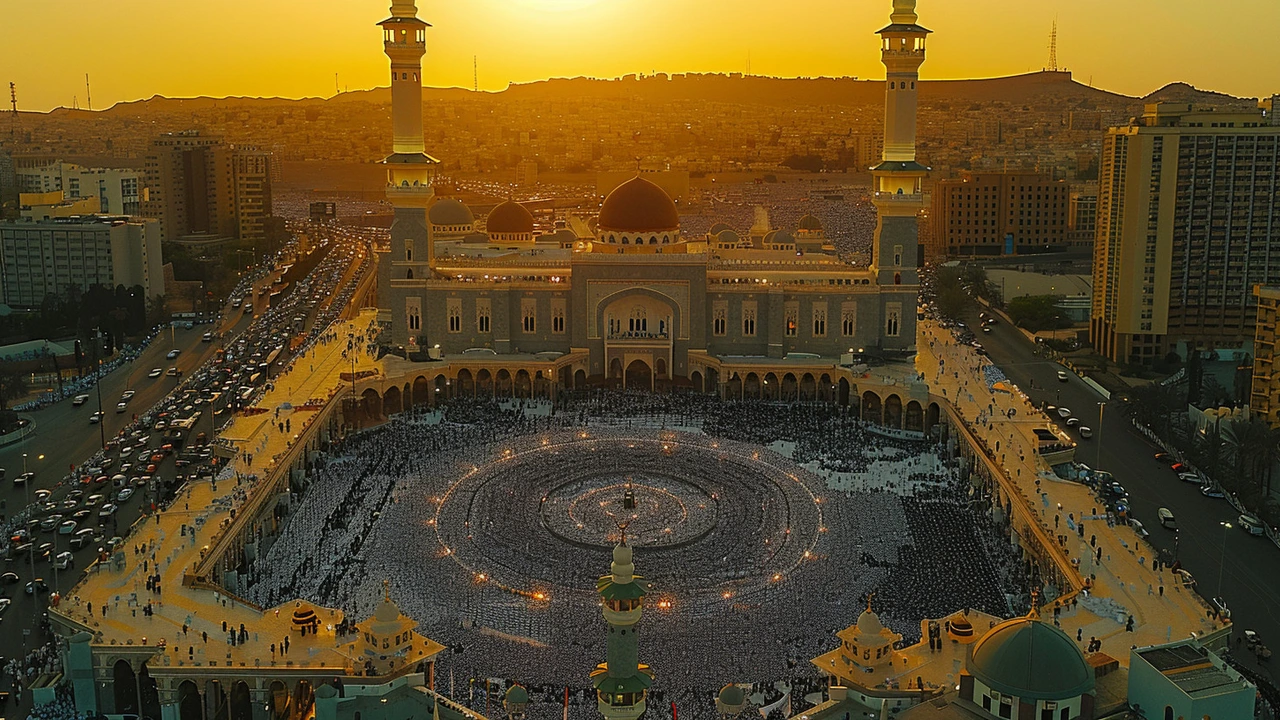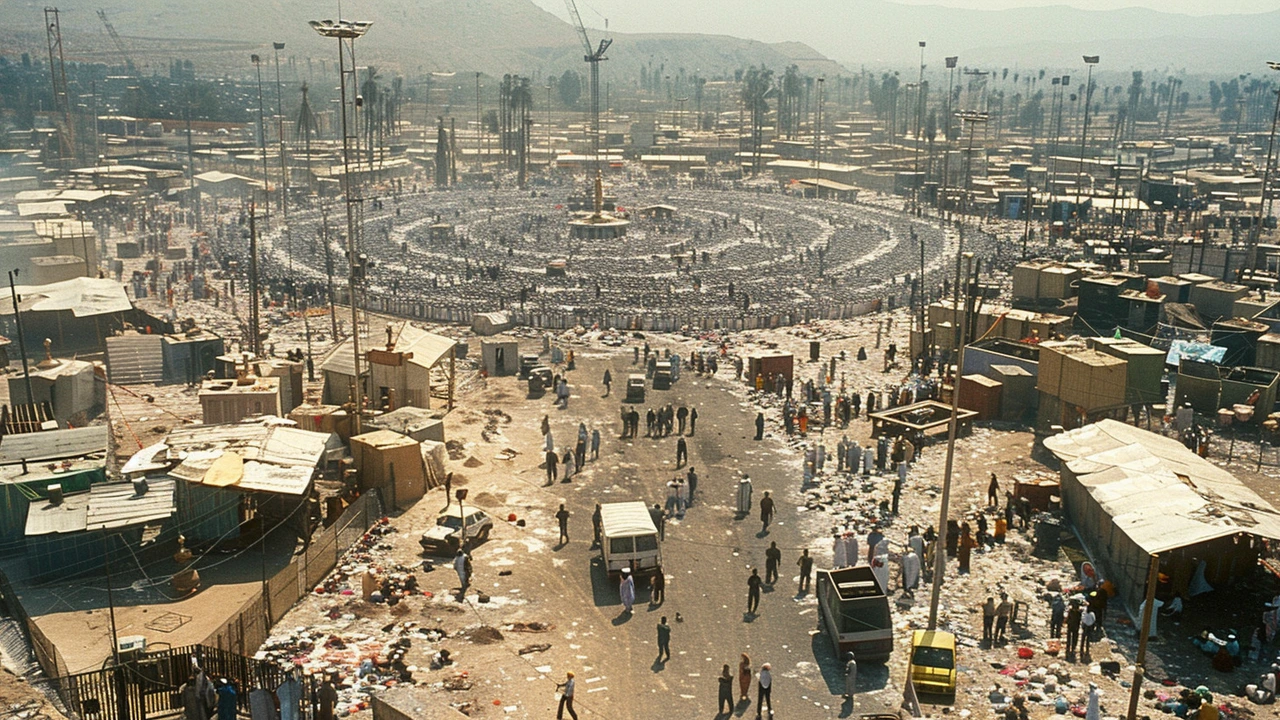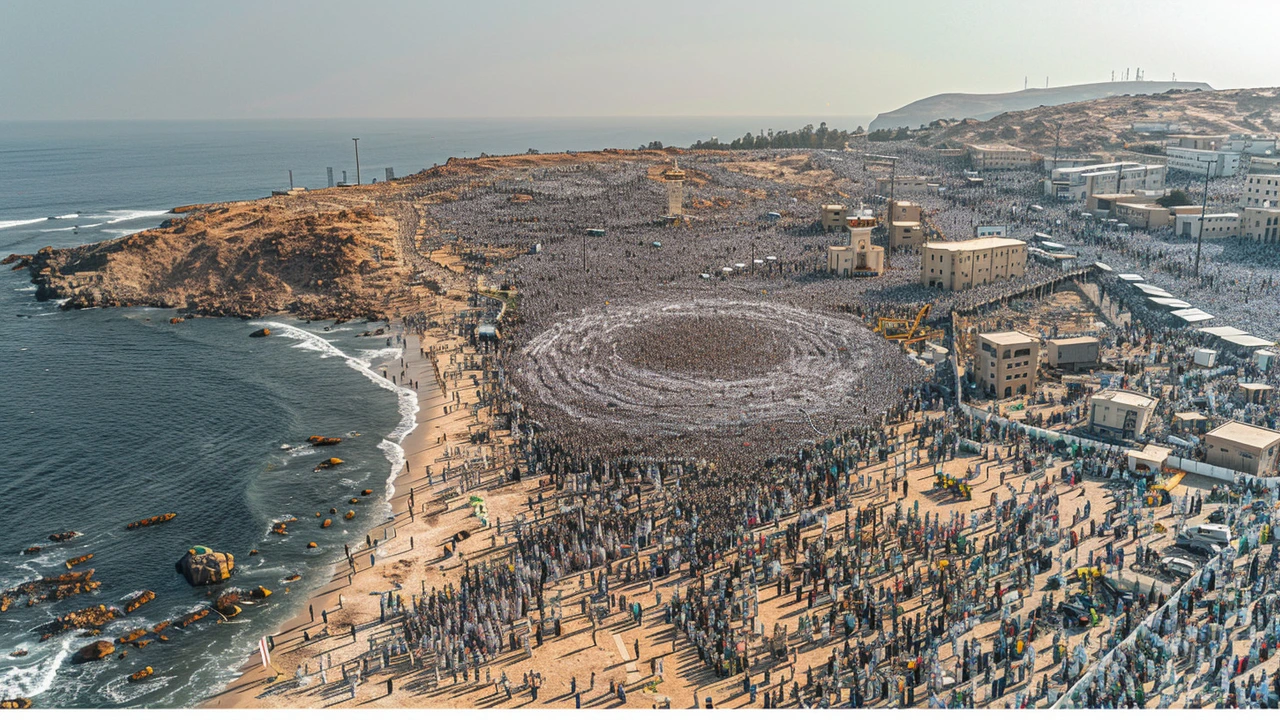Muslim Pilgrims Gather on Mount Arafat in Hajj Peak Amid Gaza Conflict

Each year, millions of Muslims from around the world converge on Saudi Arabia to undertake the Hajj, a pilgrimage that traces the steps of the Prophet Mohammed. This year, despite soaring temperatures that tested their endurance, over 1.5 million pilgrims climbed the storied Mount Arafat. Clad in white garments symbolizing unity and purity, the faithful began their journey at dawn, participating in hours-long prayers at the very site where their prophet delivered his last sermon.
This annual gathering represents a profound moment in Islamic devotion. However, it unfolded amid the grim context of the ongoing conflict in Gaza. As they whispered prayers and recited verses from the Quran, many could not help but direct their thoughts and supplications towards the afflicted Palestinians. The Gaza conflict has resulted in the tragic loss of over 37,266 lives, predominantly civilians, putting an even heavier emotional weight on this year's Hajj.
Despite the Saudi Arabian government's stern warning – issued by the minister responsible for religious pilgrimages, Tawfiq al-Rabiah – that 'no political activity' would be tolerated, signs of political expression were still present. At least one voice was raised in support of the Palestinians, an act that resonates deeply given the backdrop of the crisis.
Notably, Iranian Supreme Leader Ayatollah Ali Khamenei sent a poignant message to the pilgrims. He urged unyielding support for the 'ironclad resistance of Palestine and the patient, oppressed people of Gaza.' The presence of around 2,000 Palestinians among the pilgrims, invited personally by Saudi King Salman, further emphasized the intersection of faith and geopolitical tension.
For these pilgrims, the journey to Mount Arafat is not merely a religious obligation but a deeply spiritual and personal journey. The mountain, also known as the 'Mountain of Mercy,' holds a special place in Islamic tradition. Standing on this rocky outcrop, where the Prophet Mohammed is believed to have delivered his farewell sermon, pilgrims enter a state of deep contemplation, seeking mercy and forgiveness.
The Spiritual Significance of Mount Arafat
The ritual at Mount Arafat, known as 'Wuquf,' is considered the pinnacle of the Hajj pilgrimage. It is an opportunity for believers to attain a state of purity and introspection, reflecting on their lives and seeking absolution for their sins. This moment of profound spirituality brings together Muslims from diverse backgrounds in a collective act of devotion and surrender to the will of Allah.
It is said that the prayers and supplications made on Mount Arafat are the most potent, with numerous traditions highlighting the significance of this day. According to Islamic belief, it is a time when Allah's mercy and forgiveness are in abundance. Pilgrims engage in hours of prayer and reading from the Quran, with many spending the entire day standing or sitting in quiet reflection and prayer.
The Intersection of Faith and Conflict
While the Hajj is primarily a spiritual journey, it does not exist in a vacuum. The realities of the world – conflict, suffering, and injustice – often permeate the sacred rites. This year's pilgrimage to Mount Arafat saw a poignant overlap between the sacred and the political. The unfolding tragedy in Gaza was a testament to the suffering faced by many of the Muslim community members who come together in Saudi Arabia.
This overlap is not new but has been a feature of various pilgrimages throughout history. Religious observances have often been intertwined with political expressions, as faith communities seek solace, action, and support for their brothers and sisters in times of crisis. For many pilgrims, the Hajj serves as a powerful reminder of the unity and solidarity that Islam espouses, transcending national and political boundaries.

A Call for Unity and Peace
The message from the Iranian Supreme Leader further highlighted the deep connections between faith and geopolitical alignments. His call for unwavering support for the Palestinians resonates with many Muslims who view the Palestinian cause as not just a political issue, but a matter of profound religious and moral imperative.
As the pilgrims completed their prayers and supplications on Mount Arafat, a sense of unity and collective purpose pervaded the atmosphere. The spiritual highpoint of the Hajj served as a beacon of hope amidst the turmoil, reminding the faithful of their shared values and responsibilities towards one another.
While the Saudi authorities maintained a strict stance against political demonstrations, the underlying sentiments among the pilgrims could not be entirely contained. The prayers for peace and justice, whispered in countless different languages, carried a unified message of solidarity and longing for a better world.
The Broader Humanitarian Perspective
The situation in Gaza and the broader Palestinian plight remain pressing concerns for the global Muslim community. The devastating human toll highlighted by over 37,266 lives lost underscores the urgent need for international attention and sustained humanitarian efforts. In this light, the Hajj provides an avenue for Muslims to express their collective grief, hope, and commitment to supporting their brethren in need.
Moreover, the pilgrimage serves as a powerful reminder of the core tenets of Islam – mercy, compassion, and justice. As pilgrims returned from Mount Arafat, their hearts were undoubtedly heavy with the images of suffering from Gaza, yet also filled with renewed resolve. This convergence of faith and action lies at the heart of the pilgrimage experience, bridging the gap between spiritual fulfillment and tangible support for the oppressed.
In the coming days, as pilgrims complete the Hajj rituals and return to their respective homes around the world, the messages of solidarity and peace will likely reverberate within their communities. The Hajj, thus, continues to be a potent symbol of unity, resilience, and the enduring human spirit in the face of adversity.

Conclusion
The climactic gathering on Mount Arafat this year was marked not only by profound spirituality but also by an acute awareness of the ongoing conflict in Gaza. The intertwining of religious devotion with global political realities is a testament to the complex and multifaceted nature of the Hajj. For the millions of Muslims who made this pilgrimage, it was an experience that transcended mere ritual, embodying a powerful call for compassion, justice, and unity in a world rife with challenges. As they depart from the sacred sites, their prayers and supplications for peace and relief will certainly continue to resonate, both within their hearts and throughout the global Muslim community.
20 Comments
abi rama
What a powerful reminder that faith can lift us even in the darkest times.
Megan Riley
Wow!!! The sheer devotion of millions on Mount Arafat is absolutely awe‑inspiring, and it shows how our prayers can become a chorus of hope-especially when we channel them toward those suffering in Gaza!!! Keep the spirit alive, keep the prayers flowing!!!
Lester Focke
One must acknowledge that the confluence of ritualistic solemnity and geopolitical undercurrents on Arafat epitomizes a nuanced interplay between sacrosanct orthodoxy and emergent sociopolitical narratives, thereby demanding a scholarly exegesis beyond superficial reportage.
Naveen Kumar Lokanatha
Friends, it’s crucial to remember that the essence of Hajj transcends mere physical exertion; it’s about introspection, unity, and solidarity with our brothers and sisters-especially the piligrims in Gaza who endure unimaginable hardship. Let’s carry that empathy back home.
Alastair Moreton
Honestly, the Saudi crackdown on any political expression seems a bit heavy-handed, but the sheer number of people still finding ways to voice solidarity is impressive.
Surya Shrestha
Indeed, the interlocution of spiritual reverence and overt political advocacy on the plains of Arafat is-without doubt-an exemplar of contemporary theocratic discourse; a phenomenon worthy of rigorous academic scrutiny!!!
Rahul kumar
Guys the Hajj is a massive logistical feat its organisers pull off an amazing job handling millions of pilgrims even with the heat and the tensions around Gaza stay aware and support each other
mary oconnell
Clearly the “no political activity” rule is as porous as a sieve-pilgrims wielding their supplications as soft power tools, a classic case of faith‑based diplomacy in action, eh?
Michael Laffitte
Man, you can feel the weight of every soul on that mount-it’s like the whole world’s heartbeat echoing in unison, raw and real.
sahil jain
Seeing so many people unite in prayer feels uplifting 😊 it’s a reminder that compassion can rise above conflict.
Bruce Moncrieff
It’s fascinating how a centuries‑old rite still manages to mirror today’s crises and how pilgrims channel their personal hopes into a collective chant for peace
Dee Boyd
The moral imperative is clear: any deviation from the path of justice, especially in the face of such egregious civilian casualties, must be unequivocally condemned by the global ummah.
Carol Wild
The narrative presented in the article exudes a tone of melodramatic lamentation that borders on theatricality. It posits the Hajj as a singular beacon of hope amidst an otherwise bleak geopolitical tableau. Yet it neglects to interrogate the underlying power structures that enable such mass mobilizations. One must question whether the Saudi state's orchestration of the pilgrimage subtly masks its own strategic interests. Moreover, the invocation of Palestinian suffering appears as a convenient rhetorical device rather than a genuine call to action. The piece also overlooks the historical precedent of religious gatherings being co‑opted for political propaganda. While the author emphasizes unity, the reality is that myriad sectarian tensions simmer beneath the surface. In fact, the so‑called “no political activity” edict is routinely flouted, suggesting a tacit acceptance of dissent. The mention of Iranian leadership merely adds another layer of geopolitical intrigue without substantive analysis. Furthermore, the casualty figures cited, though harrowing, are presented without contextual depth or source verification. This omission fuels a sensationalist narrative that appeals to emotion rather than reason. The article’s reliance on emotive language betrays an implicit bias toward a particular ideological stance. Consequently, readers are guided toward a predetermined moral conclusion. Such journalistic framing, while compelling, risks oversimplifying a profoundly complex crisis. It is imperative that future discourse adopt a more nuanced, evidence‑based approach. Only then can we hope to transcend the echo chamber of perpetual lamentation.
Rahul Sharma
One should note, with utmost clarity, that the interweaving of religious devotion and geopolitical messaging on Arafat is not merely symbolic but serves as a potent conduit for cultural resilience; therefore, we must examine the broader implications for regional stability!!!
Emily Kadanec
Honestly, most people dont realize that the Hajj’s logistics are a marvel of modern planning, not some mystical shortcut.
william wijaya
The sheer emotional gravity of standing on Arafat while the world burns elsewhere creates a dissonance that reverberates through every fiber of a pilgrim’s being, a profound ontological tension.
Lemuel Belleza
Another day, another headline about Gaza while pilgrims pray-nothing new.
faye ambit
Contemplating the juxtaposition of spiritual ascent and worldly suffering invites us to reevaluate the parameters of collective responsibility in an interconnected existence.
Subhash Choudhary
While the moral stance is undeniable, practical pathways to alleviate the crisis require coordinated humanitarian effort beyond symbolic gestures.
Ethan Smith
The extensive analysis underscores the complexity, yet it also reminds us that concrete action must accompany discourse to truly aid those in need.

Write a comment